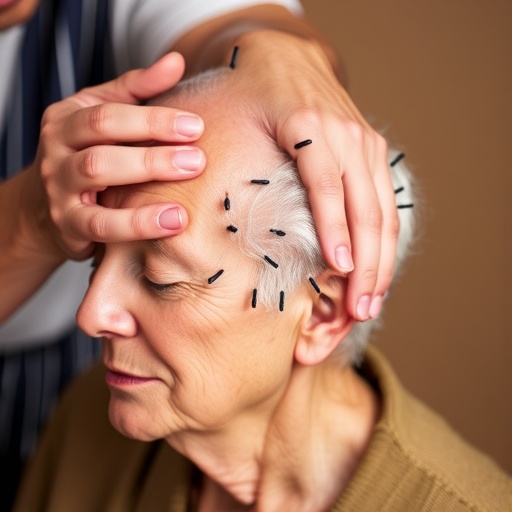Acupuncture has long been celebrated in traditional Eastern medicine for its multifaceted health benefits. Recent advancements in scientific research have propelled it into the spotlight within Western medicine, particularly as researchers investigate its potential applications for cognitive health. A new study conducted by a team from South Korea has added significant weight to this discourse, examining the effects of acupuncture on patients suffering from mild cognitive impairment (MCI). This condition is increasingly recognized as a precursor to more severe cognitive disorders, including Alzheimer’s disease and other forms of dementia. Thus, establishing effective management strategies for MCI is crucial, and this research offers a compelling glimpse into one such avenue.
The study, published in the esteemed journal BMC Complementary Medicine and Therapies, represents a pioneering exploration into how acupuncture might alleviate some of the cognitive deficits associated with MCI. The research is particularly striking due to its rigorous design, employing randomized, patient-assessor-blinded, sham-controlled methodologies. This approach ensures that the results are not confounded by placebo effects or observer biases, allowing a more accurate evaluation of acupuncture’s true impact on cognitive function.
Key to this study’s integrity is the randomization process. Participants, recruited for their diagnosis of MCI, were randomly assigned to either an acupuncture group or a sham-control group that received non-therapeutic stimulation. Such measures are critical in clinical research, allowing scientists to ascertain the efficacy of a treatment beyond mere speculation. The blinding of both patients and assessors further strengthens the validity of the findings by eliminating potential biases in treatment administration and outcome assessment.
In total, the study involved a diverse sample of participants, which enhances the generalizability of the results. The inclusion criteria were meticulously outlined, ensuring that only individuals truly suffering from mild cognitive impairment were considered. This careful selection process allows researchers to focus on the specific effects of acupuncture without the interference of confounding variables commonly found in broader participant groups. Through this rigorous framework, the researchers set the stage for an impactful study that could reshape how MCI is approached from a clinical perspective.
The acupuncture intervention itself consisted of multiple sessions over several weeks. Trained practitioners applied acupuncture needles at specific points linked to cognitive enhancement and neurological function. These acupuncture points are thought to stimulate the central nervous system, which may lead to increased blood flow, reduced inflammation, and improved neural connectivity in the brain. Understanding these physiological mechanisms provides a compelling narrative for how acupuncture might facilitate cognitive improvements among the MCI population.
Following the acupuncture treatment, participants underwent a battery of cognitive assessments designed to evaluate their memory, attention, and executive functions. The results were analyzed statistically, allowing for a clear comparison between the acupuncture group and the sham control group. Preliminary findings indicate notable improvements in cognitive function for those receiving acupuncture. Such results could herald a new era in the non-pharmacological treatment of MCI, expanding the options available to healthcare providers and patients alike.
Moreover, the implications of this research extend beyond merely offering a new treatment modality. By demonstrating that acupuncture can have measurable effects on cognitive impairment, this study may encourage further exploration into complementary therapies in dementia care. It further ignites a conversation among healthcare providers about the integration of alternative modalities in standard cognitive rehabilitation practices.
This groundbreaking study is timely, as the prevalence of cognitive disorders continues to rise globally. As populations age and the incidence of conditions like Alzheimer’s increases, the medical community is in urgent need of innovative strategies to address these challenges. Encouragingly, initial results from this research may stimulate larger-scale studies and clinical trials, further validating acupuncture as a legitimate therapeutic option for cognitive decline.
In the broader context of integrative medicine, this study bolsters the argument for employing a holistic approach to treating MCI and other cognitive disorders. Instead of relying solely on pharmaceuticals, healthcare systems worldwide can consider acupuncture as part of a comprehensive treatment plan, possibly improving patient outcomes. The positive effects observed may also encourage collaboration between traditional and modern medical practitioners, fostering a culture of interdisciplinary healthcare.
One of the notable features of this study is its focus on patient experience. In recent years, patient-centered care has become an essential aspect of medical research, emphasizing the subjective experiences of participants in clinical trials. Acupuncture, in particular, tends to resonate with patients who are seeking alternative or complementary therapies, providing them with a sense of agency in managing their health. As more studies validate these approaches, patient engagement and satisfaction may improve, leading to greater treatment adherence and overall wellness.
Ultimately, while the findings of this study are promising, it is essential to approach them with cautious optimism. Each clinical study presents an opportunity to expand our understanding of complex health conditions, but further research will be required to replicate and refine these results. Larger trials with more diverse populations will be essential to establish the robustness of acupuncture’s benefits for MCI.
In conclusion, the study conducted by Choi et al. marks a vital step forward in exploring acupuncture as a treatment for mild cognitive impairment. With its rigorous methodology and promising findings, it lays the groundwork for future research and discussions about the amalgamation of traditional practices with modern scientific paradigms. As this dialogue continues, the scientific community may unlock new solutions for tackling cognitive impairments head-on, offering hope to millions affected by these debilitating conditions.
Subject of Research: Acupuncture for mild cognitive impairment
Article Title: Acupuncture for patients with mild cognitive impairment: a randomized, patient–assessor-blinded, sham-controlled pilot study
Article References:
Choi, Y., Kim, PW., Jung, IC. et al. Acupuncture for patients with mild cognitive impairment: a randomized, patient–assessor-blinded, sham-controlled pilot study. BMC Complement Med Ther 25, 277 (2025). https://doi.org/10.1186/s12906-025-05023-5
Image Credits: AI Generated
DOI: 10.1186/s12906-025-05023-5
Keywords: acupuncture, mild cognitive impairment, cognitive health, integrative medicine, clinical trial




